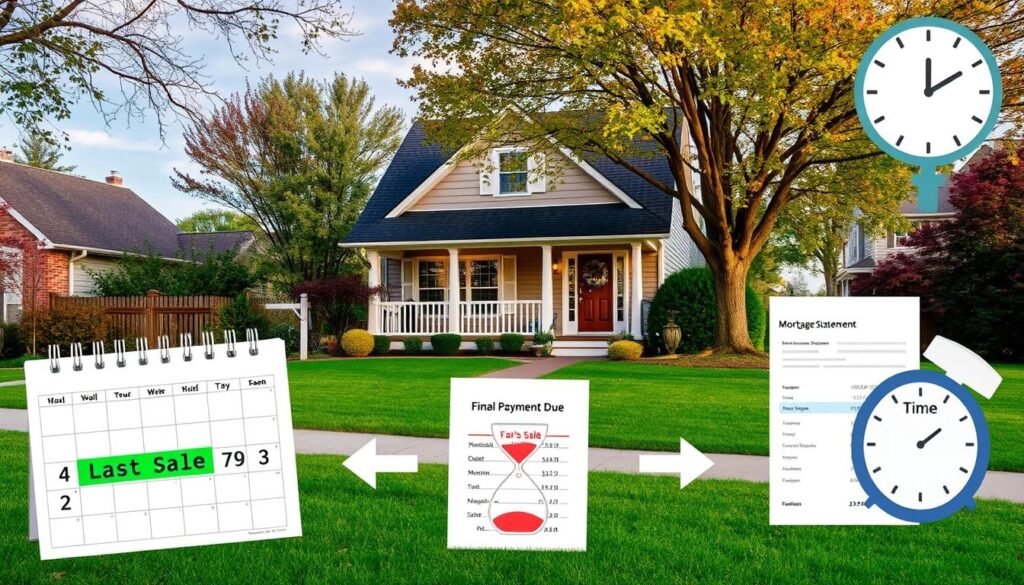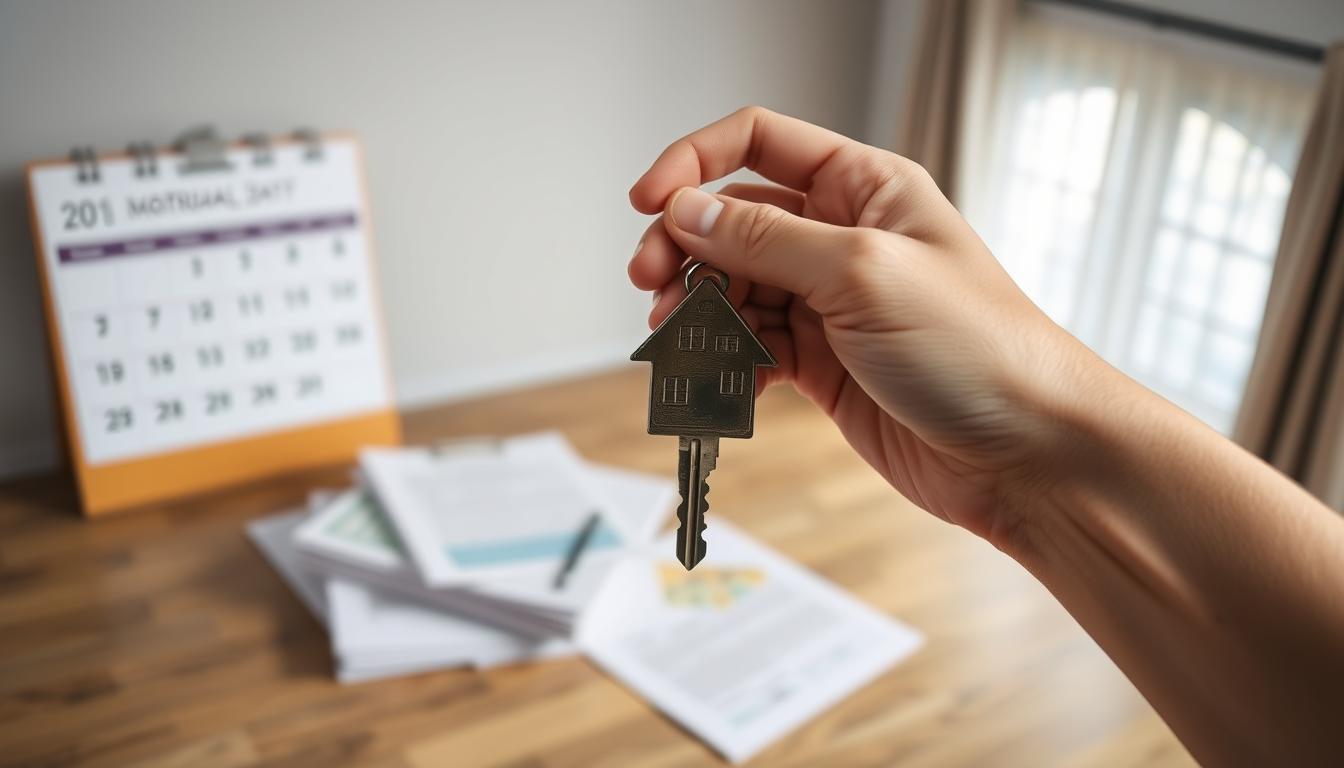Ever thought about stopping your mortgage payments when selling your home? Or are you risking unexpected fees? Knowing when to make your last mortgage payment is key to a smooth home sale. It can prevent problems that often come with selling a house.
In this article, we’ll dive into the importance of managing your mortgage during a house sale. You’ll learn how to time your final payment right. We’ll cover what affects this timing, the risks of missed payments, and what to do if you pay too much. Staying informed is essential for a hassle-free mortgage payoff during the sale.
Key Takeaways
- The final mortgage payment should ideally be made at least 7 days before the closing date.
- Most mortgage payments have a 15-day grace period; late fees apply after the 15th.
- Lenders must return any overpayments within 30 days.
- Canceling autopay before the last payment can help avoid erroneous payments.
- Closing dates during the grace period require clarification with the lender regarding final payment.
Understanding Your Mortgage Payment Obligations
Homeowners need to keep track of their mortgage payments, especially when selling their home. It’s important to keep making payments until the sale is complete. Missing payments can lead to extra fees and even foreclosure.
Not paying on time can hurt your finances. It’s key to stay on top of payments to avoid these problems.
Importance of Staying Current on Payments
Making timely mortgage payments helps avoid extra fees during the sale. Missing payments can harm your credit score. A good credit score is important for future loans.
Understanding your mortgage obligations helps make selling smoother. It ensures a successful transaction.
Consequences of Missing Payments
Missing mortgage payments can have serious effects. Lenders may take legal action, which can stop the sale. Late payments can also damage your credit score and the sale of your home.
It’s crucial to manage mortgage payments well for a successful sale. For more information, check out this resource.
When Do You Stop Paying Mortgage When Selling House
Selling a house with a mortgage can bring up many questions. One big one is when you stop making mortgage payments. To figure this out, you need to look at your last payment due date, the sale’s closing date, and the grace period in your mortgage.
Factors Affecting Final Payment Timing
Several factors affecting final payment timing are important. The closing date usually matches the end of a billing cycle. If you close before the next payment is due, you might need to make that payment. Closing after the due date means you should still pay to keep your credit good.
Grace Periods and Their Implications
Most mortgages have a grace period in mortgage terms, about 15 days. This means you’re not late until after this period, unless your contract says otherwise. Sellers should check their mortgage cycle and talk to lenders to avoid late fees or penalties during this time.

Calculating Your Last Mortgage Payment
Knowing your last mortgage payment is key when selling your home. Talking openly with your lender helps a lot. It makes sure you know what you owe before the sale.
Consulting with Your Lender
Talking to your lender is crucial for a clear payoff statement. This document shows what you still owe, interest, and any extra fees. Knowing this helps you plan for the closing costs.
It’s important to ask the lender about any issues. This way, you avoid surprises at the settlement.
Understanding Payoff Statements
Payoff statements are full of important info for sellers. They show the balance, interest, and early repayment fees. Sellers need to check this carefully.
This helps them know if they have enough money for the mortgage payoff. It makes selling your home easier and more confident.
| Item | Description |
|---|---|
| Outstanding Principal | The remaining amount owed on the mortgage. |
| Accrued Interest | Interest that has accumulated but not yet paid. |
| Prepayment Penalties | Fees charged for paying off the loan early. |
| Additional Fees | Any other costs the lender may impose during the sale. |

It’s important to understand your payoff statement well. Sellers who do this are more ready for a successful sale. For more help, check out this link.
Payoff Process During Closing
Selling a home means dealing with many financial steps, especially the payoff process at closing. Knowing this process helps both the seller and the title company work well together. This ensures everything goes smoothly and quickly, avoiding any delays.
Role of Title Companies
Title companies are key in the payoff process. They ask the mortgage lender for the payoff amount and make sure the money is used right. This makes sure all debts are paid before the new owner gets the title. It’s important to keep in touch with the title company to make sure everything is done on time.
Timing of Payoff Transactions
The timing of payoff transactions is very important. If there’s a delay in getting the payoff statement, it can cause big problems. Sellers should talk to their lender and title company to make sure everything is on track. Knowing what happens when helps manage the transaction better.
| Home Value | Estimated Fees (7%-10%) | Real Estate Commission (6%) | Example Payoff Amount |
|---|---|---|---|
| $250,000 | $17,500 – $25,000 | $15,000 | $20,000 – $100,000 |
| $300,000 | $21,000 – $30,000 | $18,000 | $20,000 – $100,000 |
| $170,000 | $11,900 – $17,000 | $10,200 | $20,000 – $100,000 |
Sellers should really look into the costs involved in selling a home. This guide here helps understand how mortgage payments fit into the process. Knowing these details helps make better decisions during a sale.
Overpayment Considerations and Refunds
Understanding overpayment considerations is key when selling a house. Sellers need to know what happens if they overpay their mortgage. If this happens, lenders must return the extra money within 30 days. This is important for sellers to get back any money they don’t owe.
What Happens If You Overpay?
Overpayments can happen due to mistakes in the final payment. It’s crucial for sellers to keep good records and talk clearly with their mortgage servicer. The law helps homeowners by making sure any extra payments are returned quickly. Sellers should make sure their servicer knows to return any extra money.
For more on your rights with mortgage payments, see this helpful resource.
Escrow Account Refunds
Sellers might also get refunds from escrow accounts. An escrow refund check is sent when there’s more money in the account than needed for taxes and insurance. This can happen if property taxes or insurance costs go down.
Escrow refunds usually come a few weeks after the mortgage servicer checks the account. While these refunds are helpful, they might not be big or come often. Sellers can use this money to build an emergency fund, pay off debts, or make extra loan payments. Knowing about these refunds helps sellers manage their money better during the selling process.
Conclusion
Understanding your final mortgage payment when selling a house is key for a smooth sale. Homeowners should talk clearly with their lenders and know their payment schedules. Planning well around closing dates is also important.
This careful approach helps avoid extra fees and ensures a smooth sale. It’s crucial for a successful transaction.
Sellers can usually use the buyer’s payment to pay off all loans, including second mortgages. Most homeowners have enough equity to sell easily. But, those in short sales face more complex talks with lenders.
When deciding how to sell, consider your options. You might sell fast to an investor or use a real estate agent for help. If you need help with mortgage steps, talking to experts can make things easier.
Need cash for your house? Call Pierre Home Buyers at 617-960-8536 for a fair offer now!






